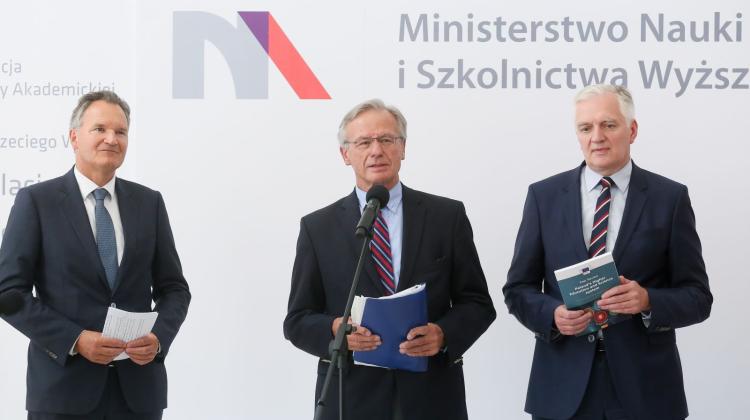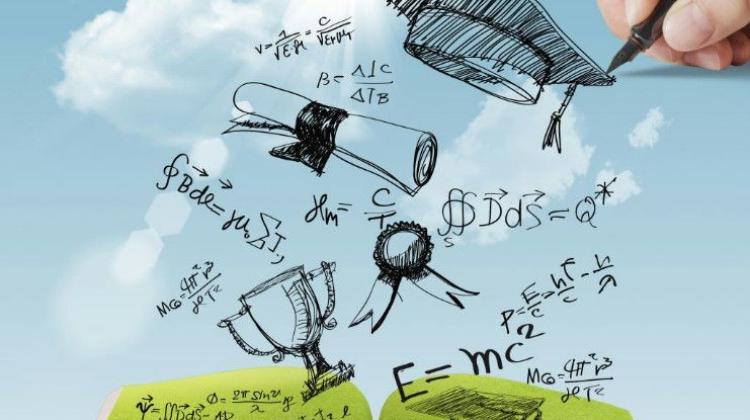Experts from the European Commission on Polish university reforms: We are optimistic
 Minister of Science and Higher Education Jarosław Gowin (R), Director-General of DG Research and Innovation at the European Commission Robert-Jan Smits (L) and the Panel chair Georg Winckler (C) during a press briefing on the European Commission's Policy Support Facility Panel report. Photo: PAP/ Paweł Supernak 13.09.2017
Minister of Science and Higher Education Jarosław Gowin (R), Director-General of DG Research and Innovation at the European Commission Robert-Jan Smits (L) and the Panel chair Georg Winckler (C) during a press briefing on the European Commission's Policy Support Facility Panel report. Photo: PAP/ Paweł Supernak 13.09.2017
Dialogue with the community, less control of the state, greater autonomy of universities - those are the recommendations for the reform of Polish universities, of which experts from the European Commission spoke Wednesday at the Ministry of Science. In their opinion the changes are urgent, but they look at the plans of the Ministry of Science with optimism.
A European Commission report prepared by the Policy Support Facility (PSF) Panel was presented at a press conference at the Ministry of Science on Wednesday. Under the PSF, EC experts can support Member States in reforming their national science, technology and innovation systems.
Deputy Prime Minister, Minister of Science and Higher Education Jarosław Gowin invited EC experts to cooperate on science reforms a year ago. "It is always worth it to learn from others, it is always good to consult our Polish point of view with experience and perspective of friends" - said Gowin on Wednesday, commenting on the decision to invite experts from the European Commission.
Director-General of DG Research and Innovation at the European Commission Robert-Jan Smits said that consultations, open dialogue with the interested parties, academics, less control by the state, greater freedom, independence, international cooperation were crucial. And seeing that those were the plans of the Ministry of Science, we was optimistic about the implementation of these plans. He noted, however, that reforms are difficult and that changes are urgently needed.
Chair of the panel expert Georg Winckler presented the main conclusions of the EC report. He pointed out that Polish science and higher education needed both consolidation and diversification. Another recommendation was to reduce bureaucracy. According to experts, universities should have more autonomy and be more responsible for their research programs. Winkler also said that it is necessary to adopt a new model for young researchers\' career paths. He expressed the view that the age in which researchers start conducting independent research was still too high in Poland. The recommendations also concern integrating Polish scientists into international co-operation. Winkler emphasized that not only the system, but also the financing required changes. He said that the system of higher education was heavily underfunded.
According to Winkler, a sense of urgency is necessary in order to successfully carry out reforms. He also talked about consultations with representatives of the Polish academic community. He pointed out that they felt the need for reforms and were waiting for them. He said he was convinced that the reform would be a success.
Jaroslaw Gowin commented: "The EC report is a huge support for our government. It is a fact that a part of the academic community in Poland does not see the need for deep or rapid change". The Deputy Prime Minister reminded that the draft law on universities would be presented on 19 and 20 September in Kraków.
The Minister of Science emphasized in his speech that some of the EC experts\' observations were consistent with the ministry\'s reform plans. He pointed out that the report mentioned the need to emphasize the role of the rector as the university administrator, greater co-operation between science and the socio-economic environment, clear division into vocational and academic universities, simplification of the university financing system, establishment of doctoral schools, bottom-up consolidation process and increased autonomy. Those points converge with the so-called "Constitution for science", or the new law on higher education.
The Policy Support Facility is an instrument funded under the Horizon 2020 Framework Programme. With its help, the European Commission offers European countries support in reforming their national science, technology and innovation systems. As part of the PSF, a group of independent experts from countries with competitive and well-functioning higher education and science systems support the preparation of reforms in these sectors, according to the needs of the applicant country.
In September 2016, Deputy Prime Minister, Minister of Science and Higher Education Jarosław Gowin expressed his interest in Poland\'s use of the mechanism offered by PSF in preparing a new law on universities and science.
The report is available on the European Commission website
Ludwika Tomala (PAP)
lt/ ekr/ kap/
tr. RL
Przed dodaniem komentarza prosimy o zapoznanie z Regulaminem forum serwisu Nauka w Polsce.


















